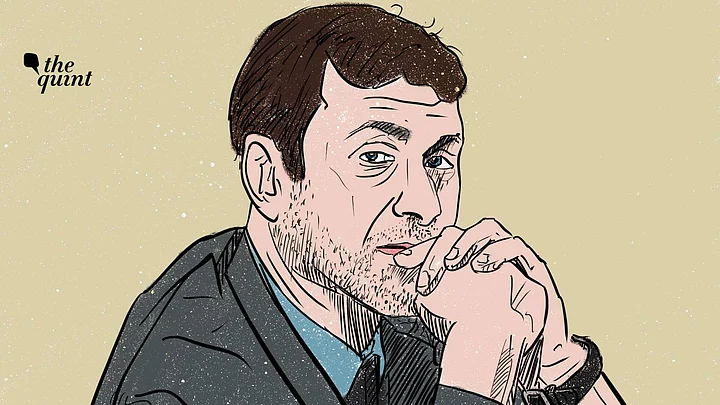Russian oligarch Roman Abramovich and some Ukrainian negotiators allegedly developed symptoms of poisoning after they met for peace talks to resolve the war between Russia and Ukraine, The Wall Street Journal reported on Monday, 28 March, citing sources.
The Chelsea Football Club owner, however, was photographed in the negotiating room with Russian and Ukrainian officials in Istanbul on Tuesday, according to another WSJ report.
The accusations of poisoning were denied by the Kremlin, whose spokesperson Dmitry Peskov on Tuesday dismissed the reports as being "part of the information panic".
Whether or not the Kremlin or the Federal Security Service (FSB) were behind the suspected poisoning, such tactics have been used by them in the past to target dissidents, spies, and critics of the Kremlin. You can read more about them here.
The WSJ report came in the backdrop of Ukrainian President Volodymyr Zelenskyy telling Russian reporters over the weekend that Abramovich was trying to help Ukraine while participating in negotiations from the Russian side.
The series of events has sparked interest in the political career of the oligarch best known for owning Chelsea FC for almost two decades before being sanctioned by the UK government.
How did he accumulate his wealth? What has his role been in Russian politics? And why is he playing the role of a 'peacemaker' in this bloody war? Read on.
Peacemaking or Self-Preservation?
Abramovich's political career (discussed subsequently) has given him a "nice guy" reputation in the competitive and hostile environment in which Russian oligarchs usually function.
While his willingness to mediate between the belligerents in order to bring an end to the war could be coming straight from the heart, many believe that self-interest is playing a bigger role in Abramovich's peacemaking endeavours.
For example, veteran Russian journalist Yevgenia Albats told The Guardian that offers from Abramovich and other Russian oligarchs to help Ukraine could be just to avoid being crippled by the sanctions that have been imposed by the US, UK, EU, and Japan among other nations.
"It's the way people are trying to save their villas, yachts and also to be on the right side of the struggle. Some of them at least are horrified. I know some who just couldn't believe what happened. Then there are some who are just concerned they're unable to pay their cleaning ladies," Albats said.
Maria Pevchikh, who is an associate of the imprisoned Alexei Navalny and the head of investigations for the Anti-Corruption Foundation that the latter established in 2011, agrees with Albats' assessment.
"How could they have forgotten who this is? He is one of the biggest sponsors of Putin's regime," Pevchikh told The Guardian.
Before Politics
Born in 1966 in the city of Saratov in Russia SFSR of the Soviet Union, Abramovich lost both his parents at a very young age.
He was raised by his relatives and spent most of his youth in Komi.
Before selling toys in Moscow, Abramovich served in the Red Army. He then sold perfumes and deodorants, gradually building his wealth via his business as the Soviet Union under Mikhail Gorbachev started becoming more receptive to private initiatives.
After the dissolution of the Soviet Union, he became the right-hand man of Boris Berezovsky, an oligarch in the 1990s who owned a car dealership and a state car manufacturing company called Lada.
Being close to Berezovsky, he became close to the Kremlin and to the then President Boris Yeltsin.
Abramovich's wealth began to explode when a large oil company called Sibneft was freed from state control, which led to it being bought by Berezovsky and Abramovich for a price much lower than the market price (during the loans-for-shares scheme, discussed here).
That purchase and the profits from Sibneft laid the foundation for Abramovich's current fortune.
He sold Sibneft back to the Russian government in 2005 for huge profits (part of Putin's state contracts to ensure that the oligarchs remain under his thumb).
Political Career
In 1999, Abramovich, having amassed enough wealth, entered politics.
He was elected to the State Duma as the representative for the Chukotka Autonomous Okrug, a region in the Far East of the country, and then elected governor in the year 2000.
Abramovich remained the governor of the region for eight years from 2000 to 2008.
He reportedly invested his own money in the social service of the region, up to $1.3 billion, leading to an improvement in living standards, schools and housing, and an increase in the region's external investments, according to Reuters.
In July 2008, the president of Russia at the time, Dmitry Medvedev, accepted Abramovich's request to resign as governor of Chukotka. It was reported that his earlier requests for the same were refused by Vladimir Putin.
He was awarded by the Russian president the Order of Honour for his "huge contribution to the economic development of the autonomous district [of Chukotka]."
Abramovich seems to have been a popular governor. Only 10 days after his resignation, Vasily Nazarenko, Chukotka's parliamentary chairman wrote a letter to him on behalf of the people, requesting him to not resign.
"The residents of the region loudly say that you Roman Arkadyevich (Abramovich) and your team have rescued Chukotka and all the region’s residents from death," the letter read.
The oligarch, however, did not change his mind.
You can read Abhimanyu Sen's detailed piece regarding Abramovich's contributions to London's Chelsea FC here.
(With inputs from WSJ, Reuters, and The Guardian.)
(At The Quint, we question everything. Play an active role in shaping our journalism by becoming a member today.)
